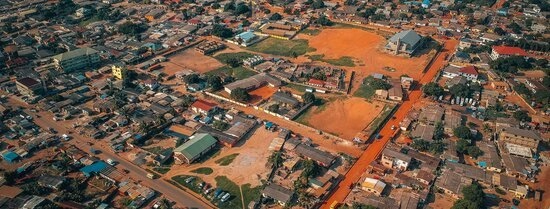Strengthening the role of women in integrated water and land management for sustainable food and nutrition security in Peri-urban Ghana
Eligible countries | Ghana and Nigeria |
Dates | February 7-25, 2022 |
Course modality | The course will take place in a blended learning environment. In week one (February 7-11), the participants will join the course fully online, and in the last two weeks (February 14-25), teaching will be done face to face, on-site, in Ghana. |
Application deadline | January 7, 2022 |
Expected selection outcome | January 12, 2022 |
Local partners | Institute for Housing and Urban Development Studies (IHS) of Erasmus University Rotterdam, Department of Real Estate and Land Management (DRELM), SD Dombo University of Business and Integrated Development Studies in Wa, Ghana |
Course coordinators | Charmae Nercua and Ore Fika |
This course is organised with the support of the Dutch Ministry of Foreign Affairs and Nuffic.
Should I join the course?
This course is intended for Orange Knowledge Programme (OKP)/Netherlands Fellowship Programme (NFP) alumni from Ghana and Nigeria. Alumni are allowed to invite colleagues if well motivated and to a limited extent. This course is aimed at alumni whose current practice is related to the theme of the course. Female participation is strongly encouraged. The participants will be chosen based on their relevant professional backgrounds, strong motivation and high potential of the prolonged development impact of the training.
What will I learn?
By the end of this course, you should be able to:
- Understand and discuss the impacts of urbanisation and climate change on food and nutrition security, water and land management in West African countries
- Understand and explain the gender gaps on land and water rights in the context of Ghana and West Africa
- Understand and explain the theories, concepts of inclusive and gender-sensitive water and land resource planning and management
- Discuss trends and new paradigms in water and land management, including ecosystem-based approaches (EbA) and climate-smart agriculture
- Analyse the social, legal and economic impacts of unsustainable land and water management practices on women empowerment in West Africa through action research
- Develop an action plan incorporating the principles of inclusive and gender-sensitive water and land-use planning and management
- Implement a pilot community project incorporating gender-sensitive principles in peri-urban farming
Course Content
According to the Food and Agriculture Organization (FAO), women are the backbone of agriculture and food production in Sub-saharan Africa, producing almost 80% of its food. However, African women farmers are excluded from the conversations that determine land and agricultural policies. At the same time, discriminatory laws and other legal instruments deprive them of their land, rights, and livelihoods. Both in research and policy, there is little attention given to the pivotal role of women in agriculture, natural resource management and in promoting food security. This course would allow the participants to investigate, analyse and dig deeper into the role of women in promoting sustainable food security in Ghana.
The course will introduce new trends in sustainable water and land management including ecosystem-based approaches (EbA) such as nature-based solutions (NBS) which would provide participants new knowledge and skills that they could utilize in the institutions where they worked for.
The refresher course is designed to deliver the foundational knowledge fully online in 1 week (Modules 1 & 2). The application of tools and methodologies & the action research will be delivered face to face (2 weeks). Hence, the course will be delivered in a blended learning environment.
Component 1: Theories, Concepts, and Practical Examples in the context of West Africa
Inputs are delivered through lectures, group discussions, and debates. (ONLINE)
Module I Week 1
- Using the gender lens in understanding urbanisation trends and climate change impacts to food and nutrition security, water and land management in West African countries
- Explaining the gender gaps on land and water rights in the context of Ghana and West Africa
- Understanding the theories, concepts of inclusive and gender-sensitive water and land resource planning and management
- New paradigms in water and land management, including ecosystem-based approaches (EbA) and climate-smart agriculture with a focus on the role of women and the vulnerable communities
Component 2: Linking theory to practice (face to face)
This component would implement the action research process and the action planning process.
Module II Week 2 Action Research Process
The participants will analyse and investigate the social, legal and economic impacts of unsustainable land and water management practices on women empowerment in Peri-urban Ghana. They will perform the following action research steps:
- Selecting a focus
- Clarifying theories
- Identifying research questions
- Collecting data
- Analysing data
- Reporting results
- Taking informed action
Module II Week 3 Action Planning Workshop
The participants will be divided into four groups will execute six main steps to produce an action plan:
- SWOT/Problem Analysis
- Stakeholder analysis
- SMART objective setting
- Force Field analysis
- Strategy development
- Scheduling and Action Plan
At the end of the second week, one (1) pilot community project incorporating gender-sensitive principles in peri-urban farming will be implemented based on the comprehensive action plan developed by the group. The idea is that this pilot project will showcase and demonstrate how gender-sensitive practices in peri-urban farming are done.
